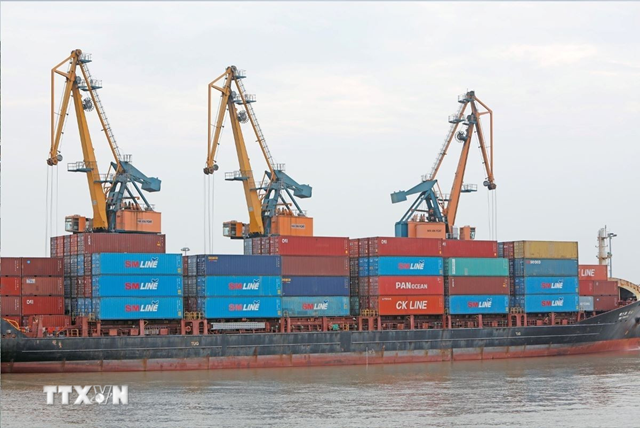
Seafood processing for export. (Photo: Vũ Sinh/TTXVN)
|
As the nation gears up for the 14th National Party Congress, the spirit of Resolution No. 68-NQ/TW on private economic development is gaining momentum, solidifying its position as the “most important driving force” in the national economy.
Fueled by the ripple effects of numerous breakthrough strategic resolutions, the transition to a two-tier administrative model, the consolidation of localities and ministries, and substantial investments in infrastructure, the private business community continues to transform robustly. They are emerging as the vanguard, creating new momentum and contributing to a new era of national growth.
Growing alongside the nation’s renewal journey, the private sector has evolved from a position of uncertainty to a significant contributor to the country’s construction and defense. In the new context, private economic development has become a crucial driver, empowered by Resolution 68-NQ/TW and various other resolutions. These provide equal investment opportunities in key areas such as infrastructure, innovation, digital transformation, and green energy.
Affirming Its Role as the Most Important Driver
Prime Minister Phạm Minh Chính emphasized that Vietnam’s private sector has firmly established itself as the most important driver of the economy. It plays a pivotal role in boosting economic growth, increasing state budget revenue, efficiently mobilizing social resources for development investment, creating jobs and livelihoods, improving living standards, ensuring social welfare, and fostering international integration.
The Prime Minister noted with pride that “the more pressure we face, the more resilient and determined our nation becomes.” Over the past period, we have achieved month-on-month, quarter-on-quarter, and year-on-year growth, with this term projected to outperform the previous one.
A clear example is the third quarter of this year, where GDP growth is estimated at around 8.2%, the highest in recent years. This achievement is partly due to the contributions of businesses and entrepreneurs, reflecting the growing strength and maturity of the private sector.
The private sector’s strong presence is also evident in the 250 projects and works inaugurated and commenced during the 80th anniversary of the August Revolution and National Day. Private investment accounts for approximately 63% of the total capital in these projects.
Nguyễn Văn Thân, Chairman of the Vietnam Association of Small and Medium Enterprises, highlighted that after 40 years of renewal, the Party and State have recognized the private sector as the most important driver of the national economy. Both the private and state sectors are vital growth pillars, interconnected and inseparable, even as the private sector increasingly contributes to socioeconomic development. The role of state resources must be further leveraged, particularly through the proactive innovation and administrative reform efforts of ministries, localities, and public servants, shifting from a permissive to a service-oriented approach for businesses and citizens.
Collaborating to Build a New Institutional Framework
The business community acknowledges the government’s efforts in strengthening administrative infrastructure and economic institutions, creating a solid foundation for national development. Notably, in 2025, significant changes akin to a governance revolution have been witnessed, enhancing efficiency and propelling the nation into a new era.
Nguyễn Trung Chính, Chairman of the Board of Directors of CMC Technology Group Corporation, observed that alongside revolutionary resolutions like Resolution 68-NQ/TW on private economic development, the transition to a streamlined two-tier administrative model and the consolidation of localities and ministries are laying a robust foundation for the nation’s advancement into a new era of prosperity.

Prime Minister Phạm Minh Chính speaks at the First High-Level Comprehensive Private Economic Panorama Session (ViPEL 2025). (Photo: Dương Giang/TTXVN)
|
Đặng Hồng Anh, Chairman of the Vietnam Young Entrepreneurs Association, shared, “The spirit of ‘harmonious benefits and shared risks’ has transcended rhetoric to become an effective action principle, fostering trust and addressing business bottlenecks.”
Encouragingly, the business environment is becoming more transparent, market confidence is strengthening, and an innovative startup spirit is flourishing. New business registrations have surged, and corporate governance is shifting from a passive policy-waiting stance to proactive policy engagement. Research institutions, universities, and businesses are increasingly collaborating in innovation, particularly in digital transformation, AI, big data, and creative industries.
At a recent meeting with outstanding national business representatives on October 9, Prime Minister Phạm Minh Chính urged the business community to embrace self-confidence, pride, self-reliance, and autonomy. He called on entrepreneurs to lead boldly, “reaching out to the sea, delving into the earth, and soaring in the sky.”
The Prime Minister stressed that for rapid and sustainable development, Vietnam must breakthrough in science, technology, innovation, and digital transformation as outlined in Resolution 57 of the Politburo, while leveraging the private sector as the most important economic driver under Resolution 68.
The Politburo has also issued Resolution 41-NQ/TW on building and enhancing the role of the Vietnamese entrepreneur class in the new era, emphasizing patriotism, self-reliance, and a spirit of contribution. The Prime Minister underscored the need to create mechanisms allowing entrepreneurs to maximize their creativity and contribute wholeheartedly to the nation.
To date, the government, ministries, and localities are effectively implementing policies to support business development and expediting amendments to investment and business laws. While institutions are a breakthrough, they also present bottlenecks, requiring efforts to transform them into competitive advantages—a “breakthrough within a breakthrough.” This includes establishing a two-tier local government structure and transitioning to a development-oriented administration that proactively serves citizens and businesses.
Turning Challenges into Golden Opportunities
Vietnam is entering a new development phase, aspiring to become a high-income developed nation. In this historic journey, the business community and entrepreneurs are recognized as the core force driving national prosperity.
A strong business sector equates to a strong nation—an undeniable truth in this era. It is time for Vietnamese entrepreneurs to assert their rightful position, not merely as wealth creators but as architects of the nation’s future.
In reality, businesses and entrepreneurs have been at the forefront of promoting growth, creating jobs, contributing significantly to the state budget, and fostering innovation. Over nearly four decades of renewal, the business sector, particularly private enterprises, has proven to be the most dynamic pillar of the economy. Currently, the private sector contributes approximately 50% of GDP, over 30% of state budget revenue, and provides more than 40 million jobs, accounting for over 82% of the total workforce and nearly 60% of total social investment.
From small workshops in the early years of renewal, Vietnam now boasts powerful private conglomerates capable of competing regionally and globally. These businesses not only generate material wealth but also enhance the national brand, inspiring a culture of entrepreneurship and innovation. Even during challenging periods, such as the COVID-19 pandemic and global economic fluctuations, the private sector has remained resilient, sustaining production, preserving jobs, and supporting the government in social welfare programs.
This vividly demonstrates the patriotism and social responsibility that define the essence of Vietnamese entrepreneurs.
As the nation enters a new development phase marked by digital transformation, green economy, and knowledge-based growth, the role of the business sector, especially private enterprises, becomes even more critical. Vietnamese businesses are capable of undertaking large-scale, technologically advanced projects with efficiency and speed.
Throughout the private sector’s development, the Party and State have not only shown concern but also actively created an enabling environment. In recent years, numerous policies have been implemented to remove production and business obstacles, from administrative reforms and reduced compliance costs to promoting digital transformation, innovation, and capital market development, along with support for small and medium-sized enterprises.
Various resolutions and directives have continuously improved the business investment climate, reduced administrative procedures, and ensured legal rights for private enterprises. Notably, the Politburo recently issued Resolution 68-NQ/TW on private economic development, reaffirming the Party’s commitment and marking a significant shift in economic development thinking—respecting, encouraging, and partnering with private enterprises.
Resolution 68 sets forth breakthrough orientations, from institutional perfection and equal resource access to building a transparent, fair, safe, and favorable business environment. The Party and State clearly state: Private economic development is an objective necessity and a crucial driver for building an independent, self-reliant, and deeply integrated economy. With Resolution 68, the private sector stands at a golden opportunity to rise strongly, affirming its role as the “growth engine” of Vietnam’s economy in the new era.

Cargo handling at Hai An Port (Hai Phong). (Photo: Trần Việt/TTXVN)
|
Resolution 68-NQ/TW introduces long-term strategic solutions, such as fostering competitive regional and global private economic groups, supporting innovative startups, and perfecting legal frameworks for ownership, investor protection, and fair risk management. These directions reflect the Party’s new vision for private economic development, viewing private enterprises as integral components and endogenous resources of an independent, self-reliant economy.
The issuance and implementation of these resolutions send a clear message: The Party and State are creating the most favorable conditions for the private sector to thrive, becoming a pillar of the socialist-oriented market economy.
However, in a fiercely competitive global landscape, state support is necessary but not sufficient. The determining factor lies within each enterprise.
In the article “Private Economic Development—A Lever for a Prosperous Vietnam,” General Secretary Tô Lâm emphasized that to align with the nation’s vision, the private sector must clarify its mission and outlook. It must lead in the new era, successfully industrializing and modernizing the economy, enhancing national competitiveness, embracing social responsibility, improving living standards, and contributing to a civilized, modern society and an internationally integrated, dynamic Vietnam.
Experts suggest that to enter the new era, Vietnamese businesses must undergo significant changes in mindset, approach, and strategic vision. First, innovation must be the foundation for development. As the world shifts to digital, green, and circular economies, investing in technology, modern management, and high value-added products is essential to avoid being left behind.
Second, sustainable business culture should be cultivated, emphasizing ethics, transparency, and social responsibility. A strong enterprise is measured not only by revenue or profit but by societal trust and community contribution.
Third, collaboration, cooperation, and integration are key. No enterprise can succeed in isolation. Partnerships between private and state sectors, foreign investors, and international entities will create a synergistic ecosystem, establishing a Vietnamese production-trade-service brand.
Most importantly, businesses must uphold national pride and aspirations. In a globalized era, this pride is the “soft key” enabling Vietnamese entrepreneurs to integrate confidently without losing identity, innovate while preserving traditions and business ethics.
On October 9, during the Vietnam Entrepreneurs’ Day celebration, the Prime Minister highlighted three “vanguards” for Vietnamese businesses: Leading in science, technology, innovation, and digital transformation, focusing on core technologies, and fostering a nationwide innovation movement; exemplifying law-abiding production and business practices, contributing to a socialist rule of law state; and spearheading the implementation of Resolution 68, building a socialist-oriented market economy under the Party’s leadership and state management.
This message is not just a call to action but a roadmap for entrepreneurs in the new phase: To lead in modernizing the nation, realizing the aspiration of a strong, prosperous Vietnam. Today’s Vietnamese entrepreneurs are not just economic actors but “warriors” on the development front, affirming the nation’s endogenous strength in a dynamic global context.
Entering the new era of knowledge, creativity, and deep integration, the nation requires a robust business sector with the strength, resilience, and stature to lead as the “growth engine.”
The Party and State have consistently created optimal conditions for private sector development, from institutions and resources to competitive environments. However, turning opportunities into reality depends on the business community’s courage, responsibility, and pioneering spirit. They must demonstrate determination, intelligence, and ambition, transforming new era challenges into golden opportunities for national advancement.
Nguyễn Huyền – Quốc Huy
– 09:52 12/10/2025
Can Individuals Without Employment Contracts Still Purchase Social Housing?
The Ministry of Construction has proposed amendments to the decree, suggesting that individuals without formal employment contracts should still be eligible for social housing, provided they obtain confirmation from local commune-level police authorities.
Vietnam Opens Cryptocurrency Arena, Boosting the Digital Economy
Deputy Prime Minister Hồ Đức Phớc has signed and issued Resolution No. 05/2025/NQ-CP dated September 9, 2025, by the Government of Vietnam, regarding the pilot implementation of the cryptocurrency market in the country. This resolution will take effect from September 9, 2025.




















